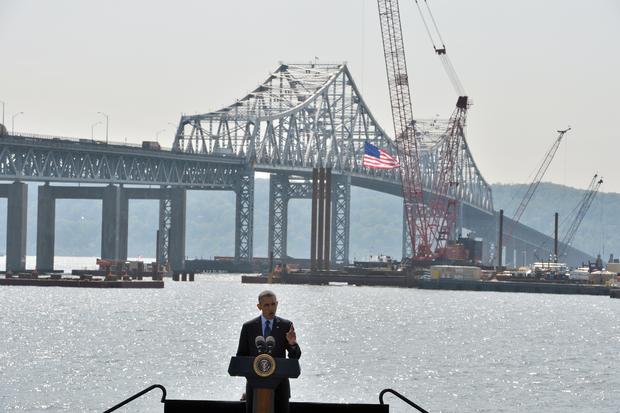Obama warns Congress: Deal with transportation funding soon
President Obama implored Congress to take action on a pending transportation crisis Wednesday, saying there would be hundreds of thousands of jobs lost and projects stalled if funding for the nation's infrastructure is allowed to lapse.
The president spoke in front of the Tappan Zee Bridge, a crumbling structure that serves as a symbol of the need for rejuvenation among the nation's aging infrastructure. Located about 20 miles north of New York City, the 60-year-old bridge handles 138,000 vehicles daily and has seen traffic volumes increase about 30 percent since 1990.
It is being replaced at a cost of $3.9 billion, part of which comes from a $1.6 billion federal loan. The project had been delayed for more than a decade until the White House put it on a list of fast-track projects in 2012, according to CBS New York.
Mr. Obama announced that the administration is taking steps to modernize the federal infrastructure permitting process in order to speed up planned construction around the nation. Fifty major projects have seen their permits expedited, and 30 have finished the process, according to the White House. The Tappan Zee Bridge is one such example, having completed the permitting and review process in one and a half years instead of the normal three to five.
Mr. Obama argued that such improvements are necessary to make sure businesses view the United States as the best place to be.
"We could make the decision easier for businesses to locate here in the United States, here in New York state, if we do a better job rebuilding our roads, rebuilding our bridges, upgrading our ports, unclogging commute times. The alternative is to do nothing and watch businesses go to places that have outstanding infrastructure," he said.
"We can do better. We can build better and we have to," Mr. Obama added.
The plan calls for better coordination between federal agencies and creating an interagency permitting improvement center dedicated to implementing reforms.
Mr. Obama portrayed the infrastructure permitting reforms as an example an area where the administration is taking solo action rather than waiting for Congress. But lawmakers will need to act to help avert looming transportation "cliff" approaching at the end of summer as the Highway Trust Fund runs out of money in late August and the legislation that governs federal transportation policy expires at the end of September.
Earlier this week, Transportation Secretary Anthony Foxx called this "the most dire moment the American transportation system has faced in decades."
If the Highway Trust Fund runs dry at the end of August, the Department of Transportation estimates that 112,000 highway and 5,600 transit projects underway will be stopped, costing nearly 700,000 jobs. States receive about 45 percent of their transportation funds from the federal government.
The fund has traditionally been filled by the federal gas tax of 18.4 cents per gallon. It was last increased in 1993, but a combination of inflation and the increasing fuel efficiency of cars driven in the U.S. has slowly eroded the fund over the years. Since 2008, Congress has transferred in $54 billion to keep it afloat, according to the Wall Street Journal.
The Congressional Budget Office (CBO) shows a steadily increasing gap between the amount of money paid out of the fund and what it brings in. Starting in 2015, there will be a shortfall that would grow to more than 80 billion dollars by 2022 if there is no solution.
Meanwhile, renewing MAP-21 - the federal transportation bill - for six years would cost almost $100 billion just to keep up with the current spending levels on road and transit projects, the CBO projects.
One option to raise more revenue would be an increase in the gas tax, a move that has been supported by organizations ranging from the Chamber of Commerce to the AFL-CIO to AAA. But a tax increase that would affect such a broad swath of Americans is a political nonstarter, especially so close to an election year. Both the White House and Republican leadership in Congress have ruled that out.
The administration has proposed its own a four-year, $302 billion transportation plan that would be funded in part by the existing gas tax, and in part by vaguely-defined "pro-growth business tax reform." The proposal actually increases both highway and transit funding, and allows states to charge tolls on interstate highways as a way to raise funds, but is unlikely to gain any traction in the Republican-led House.
Sens. Barbara Boxer, D-Calif., and David Vitter, R-La., the leaders of the Environment and Public Works Committee, put forward a bipartisan six-year transportation bill which maintains current spending levels at about $105 billion per year, plus inflation. The House has not yet released its own proposal.
The president lambasted congressional Republicans for what he said were the wrong priorities.
"Not only have they prevented so far efforts to make sure funding's still in place for what we've already got, but their proposal would also cut grant programs," he said. "They cant say its to save money because at the very same time they've voted for trillions fo dollars in new tax cuts weighted towards the very folks at the top."
Some, he said, were too worried "that maybe they'd have to be at a bill signing with me" to allocate money for infrastructure projects.
He noted that several Republican presidents, including Abraham Lincoln, Dwight Eisenhower and Ronald Reagan all made infrastructure a high priority during their administrations.
